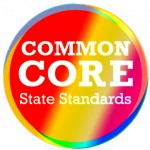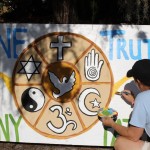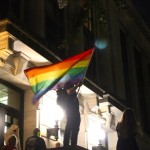The season of LGBT Pride is just around the corner and today I watched a TED Talk by Andrew Solomon that I just had to share with you here. The entire talk is deeply inspiring and I have included a portion of the transcript here that resonated deeply with me.
“We don’t seek the painful experiences that hew our identities, but we seek our identities in the wake of painful experiences.”
“I would have had an easier life if I were straight, but I would not be me, and I now like being myself better than the idea of being someone else, someone who, to be honest, I have neither the option of being nor the ability fully to imagine. But if you banish the dragons, you banish the heroes, and we become attached to the heroic strain in our own lives. I’ve sometimes wondered whether I could have ceased to hate that part of myself without gay pride’s technicolor fiesta, of which this speech is one manifestation. I used to think I would know myself to be mature when I could simply be gay without emphasis, but the self-loathing of that period left a void, and celebration needs to fill and overflow it,and even if I repay my private debt of melancholy, there’s still an outer world of homophobia that it will take decades to address. Someday, being gay will be a simple fact, free of party hats and blame, but not yet. A friend of mine who thought gay pride was getting very carried away with itself, once suggested that we organize Gay Humility Week. (Laughter) (Applause) It’s a great idea, but its time has not yet come. (Laughter) And neutrality, which seems to lie halfway between despair and celebration,is actually the endgame.
In 29 states in the U.S., I could legally be fired or denied housing for being gay. In Russia, the anti-propaganda law has led to people being beaten in the streets. Twenty-seven African countries have passed laws against sodomy, and in Nigeria, gay people can legally be stoned to death, and lynchings have become common. In Saudi Arabia recently, two men who had been caught in carnal acts, were sentenced to 7,000 lashes each, and are now permanently disabled as a result. So who can forge meaning and build identity? Gay rights are not primarily marriage rights, and for the millions who live in unaccepting places with no resources, dignity remains elusive. I am lucky to have forged meaning and built identity, but that’s still a rare privilege, and gay people deserve more collectively than the crumbs of justice.
And yet, every step forward is so sweet. In 2007, six years after we met, my partner and I decided to get married. Meeting John had been the discovery of great happiness and also the elimination of great unhappiness, and sometimes, I was so occupied with the disappearance of all that pain that I forgot about the joy, which was at first the less remarkable part of it to me. Marrying was a way to declare our love as more a presence than an absence.
Marriage soon led us to children, and that meant new meanings and new identities, ours and theirs. I want my children to be happy, and I love them most achingly when they are sad. As a gay father, I can teach them to own what is wrong in their lives, but I believe that if I succeed in sheltering them from adversity, I will have failed as a parent. A Buddhist scholar I know once explained to me that Westerners mistakenly think that nirvana is what arrives when all your woe is behind you and you have only bliss to look forward to. But he said that would not be nirvana, because your bliss in the presentwould always be shadowed by the joy from the past. Nirvana, he said, is what you arrive at when you have only bliss to look forward to and find in what looked like sorrows the seedlings of your joy. And I sometimes wonder whether I could have found such fulfillment in marriage and children if they’d come more readily, if I’d been straight in my youth or were young now, in either of which cases this might be easier. Perhaps I could. Perhaps all the complex imagining I’ve done could have been applied to other topics. But if seeking meaning matters more than finding meaning, the question is not whether I’d be happier for having been bullied, but whether assigning meaning to those experiences has made me a better father. I tend to find the ecstasy hidden in ordinary joys, because I did not expect those joys to be ordinary to me.
I know many heterosexuals who have equally happy marriages and families, but gay marriage is so breathtakingly fresh, and gay families so exhilaratingly new, and I found meaning in that surprise.
In October, it was my 50th birthday, and my family organized a party for me, and in the middle of it, my son said to my husband that he wanted to make a speech, and John said, “George, you can’t make a speech. You’re four.” (Laughter) “Only Grandpa and Uncle David and I are going to make speeches tonight.” But George insisted and insisted, and finally, John took him up to the microphone, and George said very loudly, “Ladies and gentlemen, may I have your attention please.” And everyone turned around, startled. And George said, “I’m glad it’s Daddy’s birthday. I’m glad we all get cake. And daddy, if you were little, I’d be your friend.”
And I thought — Thank you. I thought that I was indebted even to Bobby Finkel, because all those earlier experiences were what had propelled me to this moment, and I was finally unconditionally grateful for a life I’d once have done anything to change.
The gay activist Harvey Milk was once asked by a younger gay man what he could do to help the movement, and Harvey Milk said, “Go out and tell someone.” There’s always somebody who wants to confiscate our humanity, and there are always stories that restore it. If we live out loud, we can trounce the hatred and expand everyone’s lives.
Forge meaning. Build identity. Forge meaning. Build identity. And then invite the world to share your joy.”
Andrew Solomon is a writer and lecturer on psychology, politics, and the arts; winner of the National Book Award; and an activist in LGBT rights, mental health, and the arts.
Solomon’s newest book, Far From the Tree: Parents, Children, and the Search for Identity, published on November 13, 2012, won the National Book Critics Circle award for nonfiction; the J. Anthony Lukas award; the Anisfield-Wolf Award; the Wellcome Book Prize; Books for a Better Life Award; Yale University’s Research Advocacy Award; the GRASP Friend and Benefactor award; the Fountain House Humanitarian Award; the Mike Wallace Award of the University of Michigan; the Columbia Gray Matters Award; the Green Carnation Prize; and the Distinguished Achievement Award in Nonfiction of the National Council on Crime and Delinquency.












